
Help! is the fifth studio album by the English rock band the Beatles and the soundtrack to their film of the same name. It was released on 6 August 1965 by Parlophone. Seven of the fourteen songs, including the singles "Help!" and "Ticket to Ride", appeared in the film and take up the first side of the vinyl album. The second side includes "Yesterday", the most-covered song ever written. The album was met with favourable critical reviews and topped the Australian, German, British and American charts.
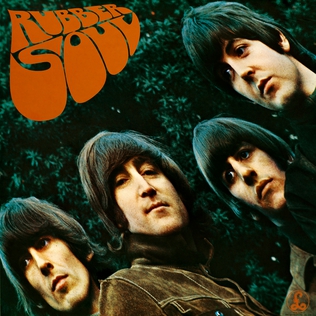
Rubber Soul is the sixth studio album by the English rock band the Beatles. It was released on 3 December 1965 in the United Kingdom on EMI's Parlophone label, accompanied by the non-album double A-side single "Day Tripper" / "We Can Work It Out". The original North American release, issued by Capitol Records, contains ten of the fourteen songs and two tracks withheld from the band's Help! (1965) album. Rubber Soul was described as an important artistic achievement by the band, meeting a highly favourable critical response and topping sales charts in Britain and the United States for several weeks.

"Norwegian Wood (This Bird Has Flown)", otherwise known as simply "Norwegian Wood", is a song by the English rock band the Beatles from their 1965 album Rubber Soul. It was written mainly by John Lennon, with lyrical contributions from Paul McCartney, and credited to the Lennon–McCartney songwriting partnership. Influenced by the introspective lyrics of Bob Dylan, the song is considered a milestone in the Beatles' development as songwriters. The track features a sitar part, played by lead guitarist George Harrison, that marked the first appearance of the Indian string instrument on a Western rock recording. The song was a number 1 hit in Australia when released on a single there in 1966, coupled with "Nowhere Man".
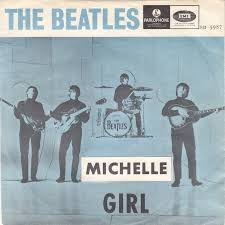
"Michelle" is a song by the English rock band the Beatles from their 1965 album Rubber Soul. It was composed principally by Paul McCartney, with the middle eight co-written with John Lennon. The song is a love ballad with part of its lyrics sung in French.
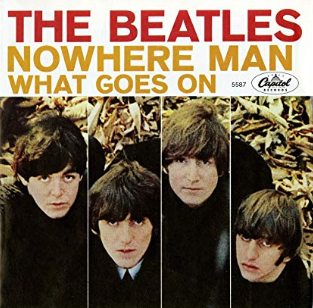
"Nowhere Man" is a song by the English rock band the Beatles. It was released in December 1965 on their album Rubber Soul, except in the United States and Canada, where it was first issued as a single A-side in February 1966 before appearing on the album Yesterday and Today. The song was written by John Lennon and credited to the Lennon–McCartney partnership. In the U.S., the single peaked at number 3 on the Billboard Hot 100 and number 1 on the chart compiled by Record World magazine, as it did the RPM 100 chart in Canada and in Australia. The song was also released as a single in some countries where it had been included on Rubber Soul, including Australia, where it topped the singles chart.
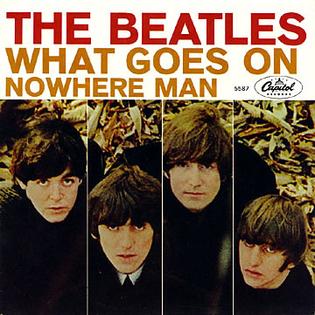
"What Goes On" is a song by the English rock band the Beatles, featured as the eighth track on their 1965 album Rubber Soul. The song was later released as the B-side of the US single "Nowhere Man", and then as the tenth track on the North America-only album Yesterday and Today. It is the only song by the band credited to Lennon–McCartney–Starkey and the only song on Rubber Soul that features Ringo Starr on lead vocals. The song reached number 81 on the US Billboard Hot 100 in 1966.

"Think for Yourself" is a song by the English rock band the Beatles from their 1965 album Rubber Soul. It was written by George Harrison, the band's lead guitarist, and, together with "If I Needed Someone", marked the start of his emergence as a songwriter beside John Lennon and Paul McCartney. The song's lyrics advocate independent thinking and reflect the Beatles' move towards more sophisticated concepts in their writing at this stage of their career. The song has invited interpretation as both a political statement and a love song, as Harrison dismisses a lover or friend in a tone that some commentators liken to Bob Dylan's 1965 single "Positively 4th Street". Among musicologists, the composition has been recognised as adventurous in the degree of tonal ambiguity it employs across parallel major and minor keys and through its suggestion of multiple musical modes.

"Wait" is a song by the English rock band the Beatles from their 1965 album Rubber Soul. The song is credited to the Lennon–McCartney partnership. In the 1997 book Many Years from Now, Paul McCartney recalls it as entirely his work. In a 1970 interview with Ray Connolly, John Lennon could not remember writing it, saying, "That must be one of Paul's."

"Drive My Car" is a song by the English rock band the Beatles, written primarily by Paul McCartney, with lyrical contributions from John Lennon. It was first released on the band's 1965 album Rubber Soul as the opening track. The song later appeared in North America on the Yesterday and Today collection, again to open the record, as the track had been dropped from the American version of Rubber Soul.
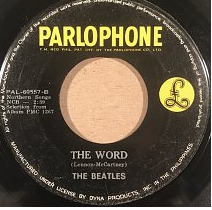
"The Word" is a song by the English rock band the Beatles, written by John Lennon and Paul McCartney and recorded with Lennon on lead vocals. It was first released on their 1965 album Rubber Soul.
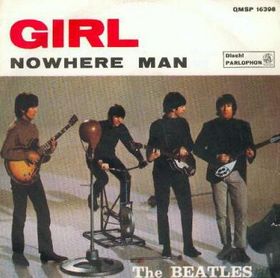
"Girl" is a song by the English rock band the Beatles from their 1965 album Rubber Soul. It was written by John Lennon and credited to Lennon–McCartney. "Girl" was the last complete song recorded for that album. "Girl" is considered to be one of the most melancholic and complex of the Beatles' earlier love songs.

"I'm Looking Through You" is a song by the English rock band the Beatles from their 1965 album Rubber Soul. It was written by Paul McCartney and credited to Lennon–McCartney. McCartney wrote the song about English actress Jane Asher, his girlfriend for much of the 1960s, and her refusal to give up her stage career and focus on his needs. The line "You don't look different, but you have changed" reflects his dissatisfaction with their relationship. The lyrics also refer to his changing emotional state: "Love has a nasty habit of disappearing overnight".
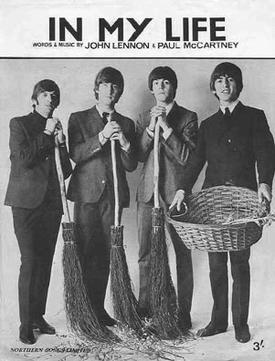
"In My Life" is a song by the English rock band the Beatles, released on their 1965 studio album, Rubber Soul. Credited to the Lennon–McCartney songwriting partnership, the song is one of only a few in which there is dispute over the primary author; John Lennon wrote the lyrics, but he and Paul McCartney later disagreed over who wrote the melody. George Martin contributed the piano solo bridge.

"If I Needed Someone" is a song by the English rock band the Beatles, written by George Harrison, the group's lead guitarist. It was released in December 1965 on their album Rubber Soul, except in North America, where it appeared on the June 1966 release Yesterday and Today. The song reflects the reciprocal influences shared between the Beatles and the American band the Byrds. On release, it was widely considered to be Harrison's best song to date. A recording by the Hollies was issued in Britain on the same day as Rubber Soul and peaked at number 20 on the national singles chart.

"Run for Your Life" is a song by the English rock band the Beatles from their 1965 album Rubber Soul. It was written primarily by John Lennon, though credited to Lennon–McCartney.

"You're Going to Lose That Girl" is a song by the English rock band the Beatles from their 1965 album and film Help! Credited to the Lennon–McCartney songwriting partnership, the song was mostly written by John Lennon with contributions from Paul McCartney.

"If I Fell" is a song by English rock band the Beatles which first appeared in 1964 on the album A Hard Day's Night in the United Kingdom and United States, and on the North American album Something New. It was written primarily by John Lennon and credited to Lennon–McCartney. "That's my first attempt at a ballad proper. ... It shows that I wrote sentimental love ballads way back when", Lennon stated in his 1980 Playboy interview. Paul McCartney stated that he contributed to the song: "We wrote 'If I Fell' together."
The recordings made by the Beatles, a rock group from Liverpool, England, from their inception as the Quarrymen in 1957 to their break-up in 1970 and the reunion of their surviving members in the mid-1990s, have huge cultural and historical value. The studio session tapes are kept at Abbey Road Studios, formerly known as "EMI Recording Studios," where the Beatles recorded most of their music. While most have never been officially released, their outtakes and demos are seen by fans as collectables, and some of the recordings have appeared on countless bootlegs. The only outtakes and demos to be officially released were on The Beatles Anthology series and its tie-in singles and anniversary editions of their studio albums. Bits of some previously unreleased studio recordings were used in The Beatles: Rock Band video game as ambient noise and to give songs studio-sounding beginnings and endings. In 2013, Apple Records released the album The Beatles Bootleg Recordings 1963, which includes previously unreleased outtakes and demos from 1963, to stop the recordings from falling into the public domain.
The Beatles' 1965 tour of the United Kingdom was a concert tour that took place between 3 and 12 December 1965, comprising 18 shows at nine venues across England, Scotland and Wales. It coincided with the release of the Beatles' studio album Rubber Soul and their double A-side single "Day Tripper" / "We Can Work It Out", and was the final UK tour undertaken by the band. Weary of Beatlemania, the group conceded to do the tour but refused to also perform a season of Christmas concerts as they had done over the 1963–64 and 1964–65 Christmas seasons.











